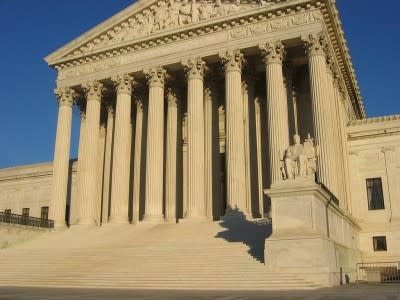Four big Supreme Court decisions on the radar
As the Supreme Court continues a busy week, Court watchers are wondering if a significant case from last fall could be announced in the next few weeks.
Of the 22 cases argued at the Supreme Court in October and November, 17 cases have already been decided. But four of the remaining five cases from that time period are consider major cases, which have received considerable attention in the press and in the legal and academic worlds.
The Justices will announce at least one opinion today, and one of the major cases could be announced.
By this time last year, the Court had already decided two high-profile cases from that term. On February 19, 2013, the Justices ruled in Florida v. Harris and on February 26, the Court decided Clapper v. Amnesty International.
In the Harris case, the Court considered if police officers could search a motor vehicle for drugs once a properly trained police dog “alerted” to a smell on a vehicle. Justice Elena Kagan wrote in a unanimous opinion that police could use the dog in a vehicle search in a public area.
In Clapper v. Amnesty International, the Court considered if the respondents, including journalists, had standing under Article III of the Constitution to challenge the Foreign Intelligence Surveillance Act (or FISA). The Court, in a 5-4 decision, agreed with the federal government’s claims that the respondents’ fears were based on speculation. But the Court didn’t rule on the constitutionality of FISA.
Later in March 2013, the Court decided another major case: Florida v. Jardines. In that decision, Justice Antonin Scalia wrote the majority opinion in a 5-4 decision, which ruled against the use of a police dog to sniff out drugs at a residence as a Fourth Amendment violation.
This year, four big cases from the October/November sessions remain undecided.
McCutcheon v. FEC was heard on October 8, 2013. The basic question in front of the Court in McCutcheon is what restrictions the Constitution allows the government to put on spending in federal elections. The Court might reconsider restrictions on campaign contributions in general, too, in a McCutcheon ruling, so the fate of the 1976 Buckley ruling is also in doubt.
The second case is Schuette v. Coalition to Defend Affirmative Action, which was heard on October 15, 2013. The Schuette case challenges the constitutionality of a Michigan initiative prohibiting affirmative action programs from being employed in the state.
In November, the Court also heard arguments in Town of Greece v. Galloway, where the Justices will decide whether a town council’s practice of beginning its legislative meetings with a prayer session violates the First Amendment’s Establishment Clause.
It also heard another significant case in early November about international treaties and the 10th amendment: Bond v. the United States.
The big picture issue in the Bond case is the possible fate of a landmark 1920 Supreme Court decision: Missouri v. Holland. The Holland decision gave Congress the power to pass laws to carry out the U.S. government’s obligations under international treaties.
Recent Constitution Daily Stories
Prisoner gets Supreme Court hearing using handwritten form
Court tackles intellectual disability and the death penalty on Monday
Can you pass a basic 10-question quiz on the presidents?
How a C-grade college term paper led to a constitutional amendment



